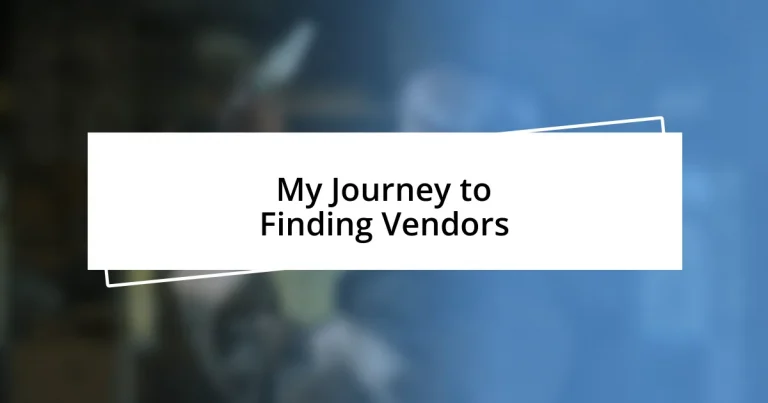Key takeaways:
- Vendors are vital partners; establishing trust and emotional connections can transform business transactions into meaningful collaborations.
- Identify specific needs and qualities desired in vendors to make informed choices that foster strong relationships.
- Conduct thorough research and evaluations based on key criteria like pricing, quality, and communication styles to select suitable vendors.
- Continuous vendor management through regular assessments and proactive engagement enhances collaboration and uncovers potential opportunities.
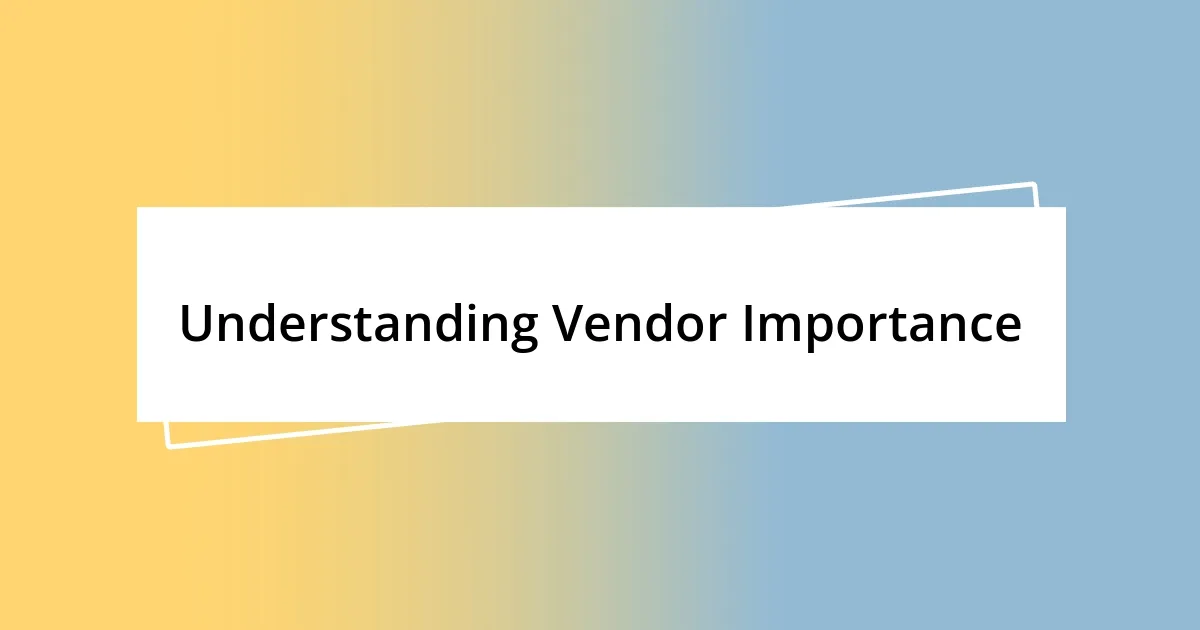
Understanding Vendor Importance
Vendors are the backbone of any successful operation, often providing essential goods and services that allow a business to flourish. I recall the early days of my own entrepreneurial journey when I struggled with unreliable suppliers. The constant stress of uncertainty was both frustrating and exhausting—did I really want to rely on vendors who couldn’t deliver?
What truly struck me was how the right vendor can elevate a business. Once I partnered with a supplier who understood my vision, everything fell into place. I often wonder, how much easier do our day-to-day operations become when we have trustworthy vendors by our side, acting as partners rather than just suppliers?
Additionally, the emotional connection I developed with a few key vendors transformed my business experience. These relationships turned into collaborations where feedback and ideas flowed freely. After all, who doesn’t appreciate a vendor who goes the extra mile, turning what could feel like just a transaction into a meaningful partnership?

Identifying Your Needs
When it comes to identifying your needs, taking a moment to reflect on your goals is essential. I remember sitting down with a notepad, jotting down exactly what I required from a vendor. It was enlightening to pinpoint not just the products or services I needed, but the qualities I desired in a partner, too.
To help focus your thoughts, consider these key aspects:
- Nature of Goods/Services: What specific products or services are you looking for?
- Quality Standards: What quality benchmarks are essential for your business?
- Reliability: How important is a vendor’s ability to deliver consistently on time?
- Communication: Do you prefer open, ongoing communication, or is a more transactional relationship acceptable?
- Cultural Fit: How well do you want the vendor’s values and work style to align with yours?
By clarifying these needs, you can make a more informed choice, paving the way for strong vendor relationships.

Researching Potential Vendors
Researching potential vendors requires a strategic approach. In my early business days, I faced confusion amidst countless choices. I quickly learned that deep research could make all the difference. I started by compiling a list of vendors, exploring their backgrounds, and reading reviews. Each testimonial or criticism contributed to a clearer picture of their reliability. Have you ever felt overwhelmed by options? I can assure you that a structured search alleviates that stress significantly.
As I delved deeper into vendor research, I created a comparison table to evaluate my options effectively. I focused on essential criteria like pricing, service quality, and delivery times. This visual method not only simplified my decision-making process but also revealed insights I might have overlooked with a simple list. I often found myself cross-referencing reviews and reaching out to other entrepreneurs for insights. Connecting with my network provided additional reassurance, and the collaborative sharing of experiences deepened my understanding—after all, a recommendation from a fellow entrepreneur is like gold.
Ultimately, I realized that part of my vendor research journey involved trusting my instincts. While data and reviews were essential, I learned to value my gut feelings too. If something didn’t feel right during initial conversations, I knew to keep searching. This blend of analytical thinking and intuition became a guiding principle as I evaluated potential partners.
| Criteria | Description |
|---|---|
| Pricing | How competitive are their rates compared to others? |
| Service Quality | What do reviews say about the quality of their products/services? |
| Delivery Times | Can they consistently meet deadlines? |
| Customer Support | Are they responsive and willing to help? |
| Cultural Fit | Do their values align with your business ethos? |
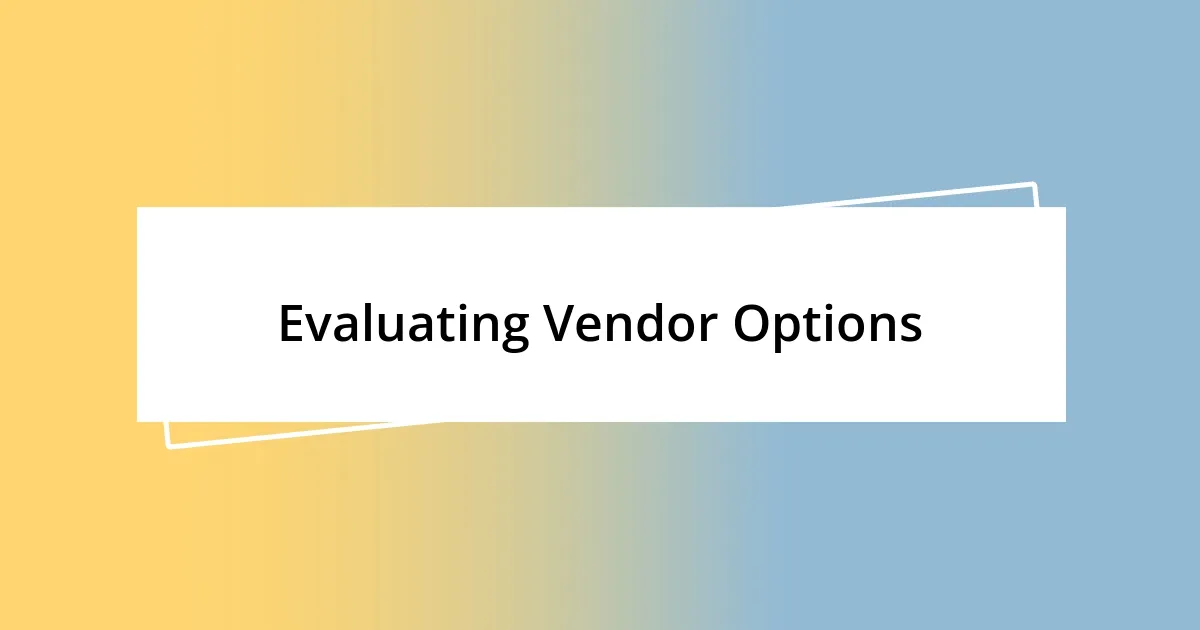
Evaluating Vendor Options
Evaluating vendor options can feel like standing at a crossroads, with many paths to choose from. I remember a particular instance when I had to decide between two seemingly equal vendors. They both had good reviews and solid pricing, but their communication styles were drastically different. One vendor was quick to respond and eager to discuss ideas, while the other was more reserved and formal. In that moment, my gut told me that I needed a partner who would actively engage with me, not just fulfill an order.
As I weighed my options, I also considered the long-term potential of each vendor relationship. I’ve learned that it’s not just about ticking boxes today but about how well they can grow with you over time. For instance, one vendor offered a premium product that I initially questioned due to the price tag. However, I realized that investing in quality would save me money and stress down the line, as I wouldn’t have to constantly replace inferior items. How often have you made a decision based solely on short-term gains, only to regret it later?
It’s vital to look beyond the numbers, focusing on how each vendor aligns with your core values. I recall chatting with a supplier whose mission closely matched mine. Their commitment to sustainability resonated with what I envisioned for my business. That connection felt significant. It wasn’t just a contract; it was about partnership. Ask yourself: how much do you value a shared vision? In the end, finding the right vendor is about establishing mutual respect, trust, and a shared journey toward success.
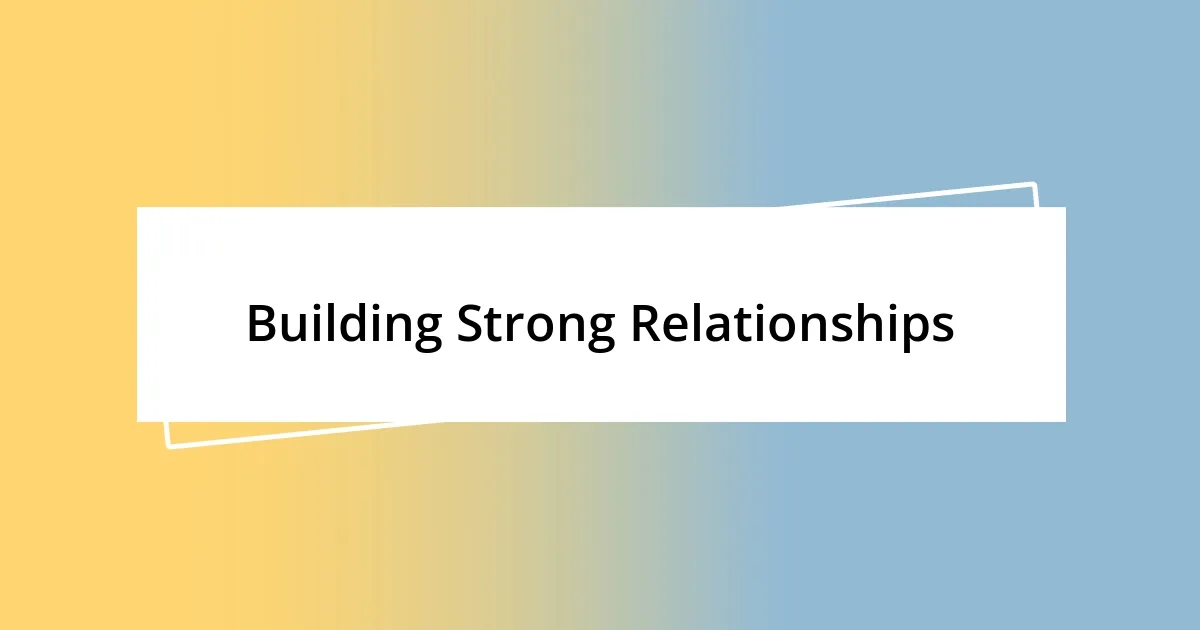
Building Strong Relationships
Building strong relationships with vendors is foundational to a successful business journey. I remember when I first began reaching out to vendors; I was often nervous, unsure of how to establish rapport. Over time, I learned that authenticity is key. When I approached conversations from a place of genuine curiosity and openness, I noticed that vendors responded positively. Just think about it—don’t we all appreciate when someone takes a sincere interest in our work and values?
As I deepened these relationships, I realized the importance of regular communication. I made it a habit to check in, not just when I needed something. Sharing updates about my business, celebrating their successes, or simply asking for their insights fostered a sense of collaboration. I found that these touchpoints often led to unexpected opportunities. Have you ever had a casual conversation turn into a breakthrough idea? For me, many valuable collaborations stemmed from moments where we shared our goals and challenges openly.
Trust is another pillar of strengthening vendor relationships. I distinctly recall a situation when a vendor faced an unanticipated delay. In the past, I might have reacted with frustration, but I took a step back and remembered our established rapport. Instead of jumping to conclusions, I reached out to understand the situation. Not only did this strengthen our relationship, but it also reassured me of their commitment to transparency. In this fast-paced business world, how often do we overlook the power of communication? When both parties feel secure in sharing challenges, it paves the way for resilience and growth.
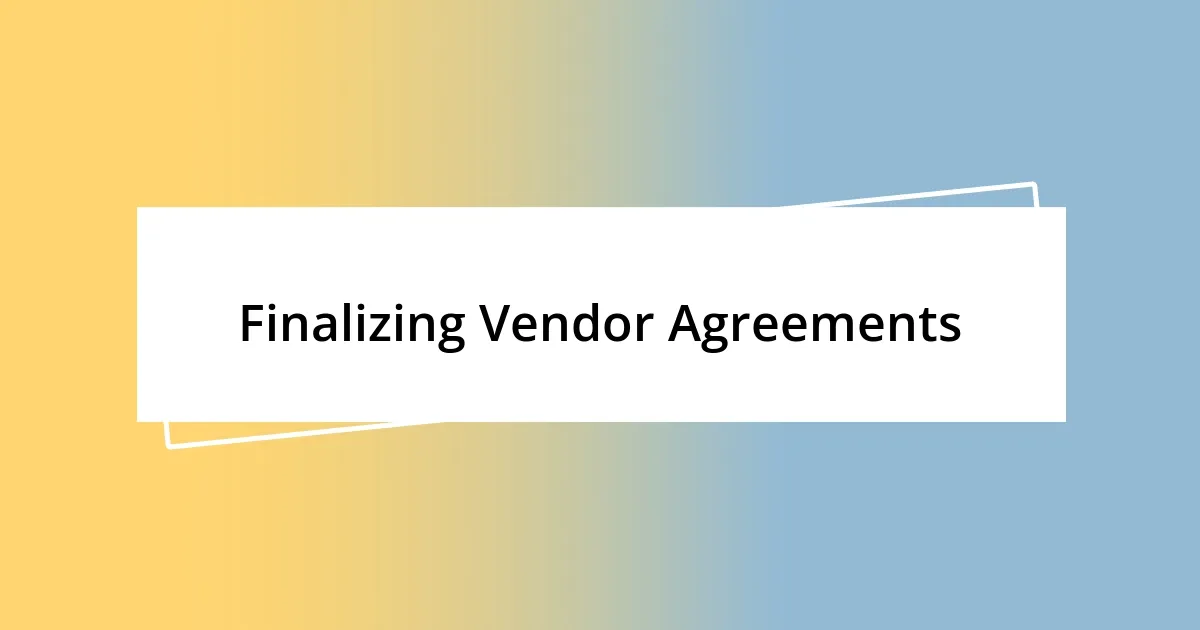
Finalizing Vendor Agreements
Finalizing vendor agreements can be a delicate dance. I’ve been in situations where I felt the pressure to rush through the paperwork, but I learned the hard way that this isn’t the time for haste. One time, I signed a contract without fully understanding the penalties for non-compliance. When I had to change suppliers unexpectedly, the fallout was far more complicated than I had anticipated. Why overlook the fine print when it can save you so much headache later?
I always make it a point to clarify expectations before the ink dries. This includes discussing delivery timelines, payment terms, and any potential contingencies. On one occasion, I negotiated clearer payment arrangements, which not only secured my budget but also built goodwill with the vendor. What has your experience been with negotiation? Finding that balance between firmness and flexibility can be the key to a successful partnership.
After I finalize an agreement, I always take a moment to reflect on the relationship moving forward. I once made a mental note to schedule regular reviews with a vendor after signing—they ended up being instrumental in our subsequent projects. Have you taken the time to envision how this partnership will evolve? Establishing a framework for ongoing communication can transform a simple agreement into a lasting collaboration. It’s the small, consistent efforts that truly enrich the partnership over time.
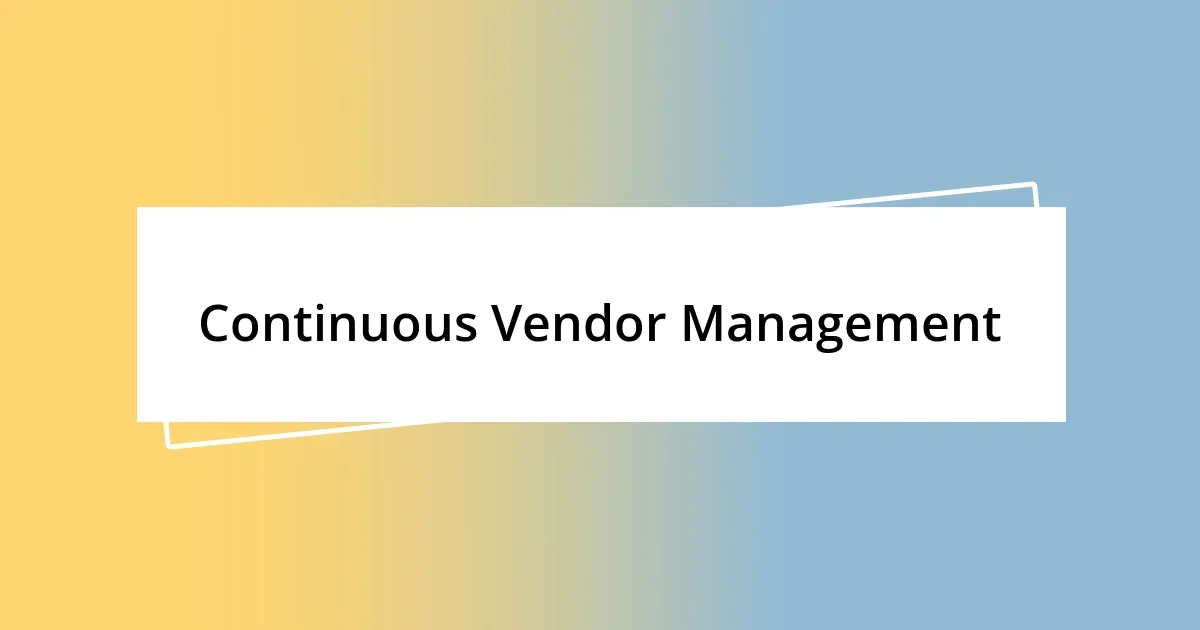
Continuous Vendor Management
Managing vendors continuously is crucial for a thriving partnership. I remember one vendor who consistently delivered outstanding service but also asked for feedback. This simple act made me feel valued. It wasn’t just a transactional relationship; it became a partnership where both sides were invested in each other’s success. Have you ever felt that your input made a real difference? I sure did.
Regular assessments of vendor performance are key in this process. At one point, I implemented a quarterly review system to evaluate deliveries, quality, and responsiveness. It surprised me how much clarity this brought to our working relationship. Honestly, it led to constructive conversations that improved our collaboration immensely. Isn’t it fascinating how the act of evaluating can open doors to innovation?
Moreover, being proactive in vendor management has its rewards. I often set aside time to explore new offerings from my vendors, much like how I’d browse a vendor’s booth at a trade show. On one occasion, I discovered a new product that fit perfectly with our strategy. If I hadn’t been proactive, I might have missed that opportunity. Isn’t it rewarding to uncover potential just by staying engaged?












